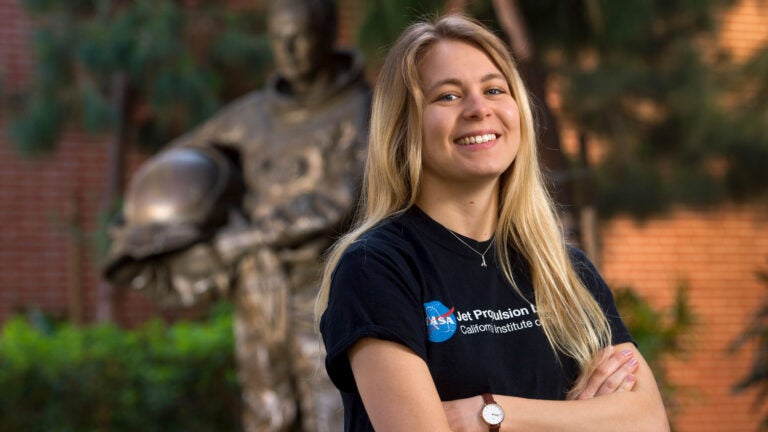
Emilie Skoog is passionate about science and rediscovered a love for outer space during a freshman-year seminar. (USC Photo/Gus Ruelas)
Trojan’s revived interest in space opens new career path, with stops at NASA and JPL
Emilie Skoog spends her time researching extreme environments and telling young girls about careers in STEM.
Emilie Skoog likes space. That might be obvious from her Jet Propulsion Laboratory T-shirt or the space shuttle charm necklace around her neck.
“You can call it Endeavour,” she said with a laugh.
But Skoog, who spends her time researching extreme environments — like volcanic lakes in Iceland and what they can tell us about icy planets and moons — didn’t come to USC with Europa or Mars on the mind.
She came in planning to study sports medicine.
Her freshman admissions counselors urged her to experiment and take classes outside her major.
“They always said to really explore — to take classes that are interesting to you,” she said.
Taking the tip, she signed up for a freshman seminar “The Space Shuttle and Popular Science.”
I had always been interested in space since I was little.
Emilie Skoog
“I had always been interested in space since I was little,” she said. “It kind of opened up that there was so much more to space than engineering.”
She was still focusing on medicine but slowly started incorporating her new interest in space into her schedule. She volunteered to reconstruct the Ranger VII spacecraft to be on display at the California Science Center, working alongside retired JPL engineers for eight months.
During her sophomore year she applied for a summer internship at the NASA’s Kennedy Space Center in Cape Canaveral, Fla. She knew it would be hard to get an interview because she had missed the bulk of the deadlines.
“It was 5 a.m. in Leavey Library and I get this email,” she said. It was an email asking to set up an interview.
“I was like, ‘ Wow, this is my one shot. I can’t mess up.’”
During her phone interview with Matthew Mickens, who later became her mentor, she realized they had some things in common.
“When I was in seventh grade, my science fair project was extremely similar to what he was researching at Kennedy — growing plants with different types of light,” she said, noting his research on LED light and growing a type of Romaine lettuce on Mars.
Beating the best
She beat out some of the nation’s top students and applicants with years of botany experience for the internship. She thinks her enthusiasm for science made her stand out.
At Kennedy, she caught up with her middle school passion: She got to work on Mickens’ research.
“That really changed everything for me,” she said. “That’s when I knew that’s what I was going to do.”
In her junior year, when she started researching in USC Earth sciences and biology Professor Jan Amend’s lab, she changed her majors to biological sciences and earth sciences. In Amend’s lab, she studies Icelandic lakes that are formed from volcanic activity under ice caps.
“For instance, Europa, we know it’s an ice cap and we think beneath is a big ocean and beneath that is some hydrothermal activity — so pretty much the same exact structure as our subglacial lake,” she said. “So studying what we can on Earth, you can say, ‘All right, there is potential for this to happen on another planet or an icy moon,’ and that can tell you there’s possibility for life maybe.”
On top of that, she interned at JPL last summer, where she investigated how to avoid contamination on Mars when scientists take samples, such as during the upcoming 2020 mission.
One thing she’s noticed during her internships was a shortage of women in STEM — science, technology, engineering and math: She was often one of the only women in the lab. A friend of hers, interning in engineering, was the only woman on the whole floor, Skoog said.
Women in STEM
Because of that, she speaks to young girls in L.A. about careers for women in STEM.
“I think women have a lot to offer the world,” she said. “I think with more diversity in everything, you are bringing together people more equipped to answer questions that we might not be able to answer right now.”
She encourages girls to think less about a perfect GPA and more about following their curiosity as women in STEM.
“Passion really, really matters,” she said.
Skoog will be pursuing her PhD at the Massachusetts Institute of Technology in the fall. She’ll study astrobiology and geochemistry.
“I don’t think I’m going to solve origin of life but I think a lot of people have had that question cross their mind at least once: How did we all get here?” she said. “I think getting closer to answering that question or eliminating some … I think that would be pretty exciting.”


